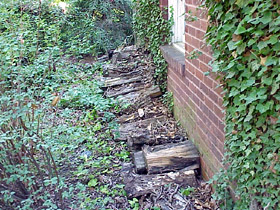Minnesota Ant Extermination
Ant extermination is one of the single most challenging pest control issues out there. Unfortunately, choosing any single method of extermination is setting yourself up for failure. All ants live for the same goal; they ensure by any means that their family lives on. Ants are just too geared towards survival for any one method to do the trick.
Continued from Part 1
Keep a Tidy Home

Never stack wood near or against your home. It can lead to problems with termites, carpenter ants and other pests.
- In order to combat an ant problem, it’s important to understand how these bugs think. Ants are survivors, and as such, their primary concerns include eating, drinking, and making more ants. As long as there’s shelter and a source of food and water present, they will do their best to make themselves at home. That being said, the first step in any ant extermination is making things a little less hospitable. Make sure all foodstuffs are sealed and stored away when they’re not being used and never leave food out that’s not being eaten. That includes dirty dishes, old pizza boxes, crumbs on the floor, even dog food should be put away at night.
Since carpenter ants are drawn to damp wood, it can be a tremendous deterrent to remove all sources of excess water in and around the home. Leaking pipes, faucets, gutters, and downspouts should be repaired, and any damaged or rotting wood should be replaced with new. Outdoor wood piles should be raised off of the ground to prevent the moistness that carpenter ants love.
Carpenter Ant Extermination
Carpenter ant infestations can be difficult to eliminate or control due to the number of satellite colonies they may establish. An experienced exterminator takes time to identify as many nest locations as possible and then treats those directly. Extermination is achieved by finding as many colonies as possible and treating each directly. Treating the parent colony is required to prevent new invasions of satellite colonies.
If you have a carpenter ant infestation, what you need is a Minnesota pest control exterminator who will locate the nest location(s) and eliminate all the ants. They are well trained in locating their nesting location and terminating the colony. They are able to tell the difference in ant species, which means they require different treatments.



